Coconut coir is an eco-friendly and all-natural product that has practical applications in several industries, from construction to gardening to home goods. Made from the hardy fibers of coconut husks, coir is both biodegradable and renewable. It’s most commonly produced in Sri Lanka and India and is shipped worldwide for a variety of uses and products.
Coir for Erosion Control
Coconut coir is an all-natural product that can help stabilize delicate shorelines, wetlands, and other areas. It degrades naturally over time, at which point vegetation will have taken hold on the affected slope. One of the most common coir erosion control methods is a coir mat. You can roll these strong coir blankets out over hillsides, streambanks, and other places in need of vegetation growth and stabilization. Plants can easily take root and grow through the mats.
Other all-natural forms of erosion control are coir logs and wattles. These flexible, log-shaped products are particularly useful for stabilizing river- and stream-banks. Made from a combination of coir mattress and coir twine, logs and wattles can also be used to protect drains, restore wetlands, and serve as natural barriers for site perimeters and gravel driveways. They typically last two to five years before biodegrading.
Coir as a Growing Medium
Coir is also a popular all-natural product for use in gardens and hydroponics systems. You can find pots, soil amendments, hanging basket liners, and more products that are constructed of coir. This material’s water-retaining, drainage, and aeration properties make for fast and healthy plant growth. Plus, it’s biodegradable and compostable. It also helps prevent plant diseases such as root rot and has an ideal pH level for most plants.
Coir’s water-holding abilities are what make it particularly useful in hydroponics systems. It can hold up to nine times its weight in water, yet still holds around 22 percent air, even when drenched. It’s a very forgiving growing medium in this scenario.
Coir in Household Items
Today you can find coir in many environmentally friendly homes. For instance, because it’s so durable, coir has become a popular material for rugs and mats. When used in doormats, the coarse, thick fibers help clean dirt and moisture from shoes and stand up well to foot traffic. They’re also water-resistant and dry quickly, preventing mold and mildew growth. Because coir is sustainable, these mats are typically less expensive than those made from other all-natural products.
Coconut coir can also be used in mattresses. Some people prefer it over synthetic materials because it provides good ventilation while reducing heat and moisture. Manufacturers are also using coco coir as an all-natural product in furniture upholstery filling and as noise-reducing wall tiles and panels where sound pollution is an issue.
Coir is a versatile, all-natural product that can be used as a substitute for synthetic or environmentally harmful materials such as plastic. It won’t pollute water bodies or pile up in landfills. Rather, it breaks down over time and serves as an organic and eco-friendly medium in the soil. It’s also easily compostable.

Leave a Reply
You must be logged in to post a comment.